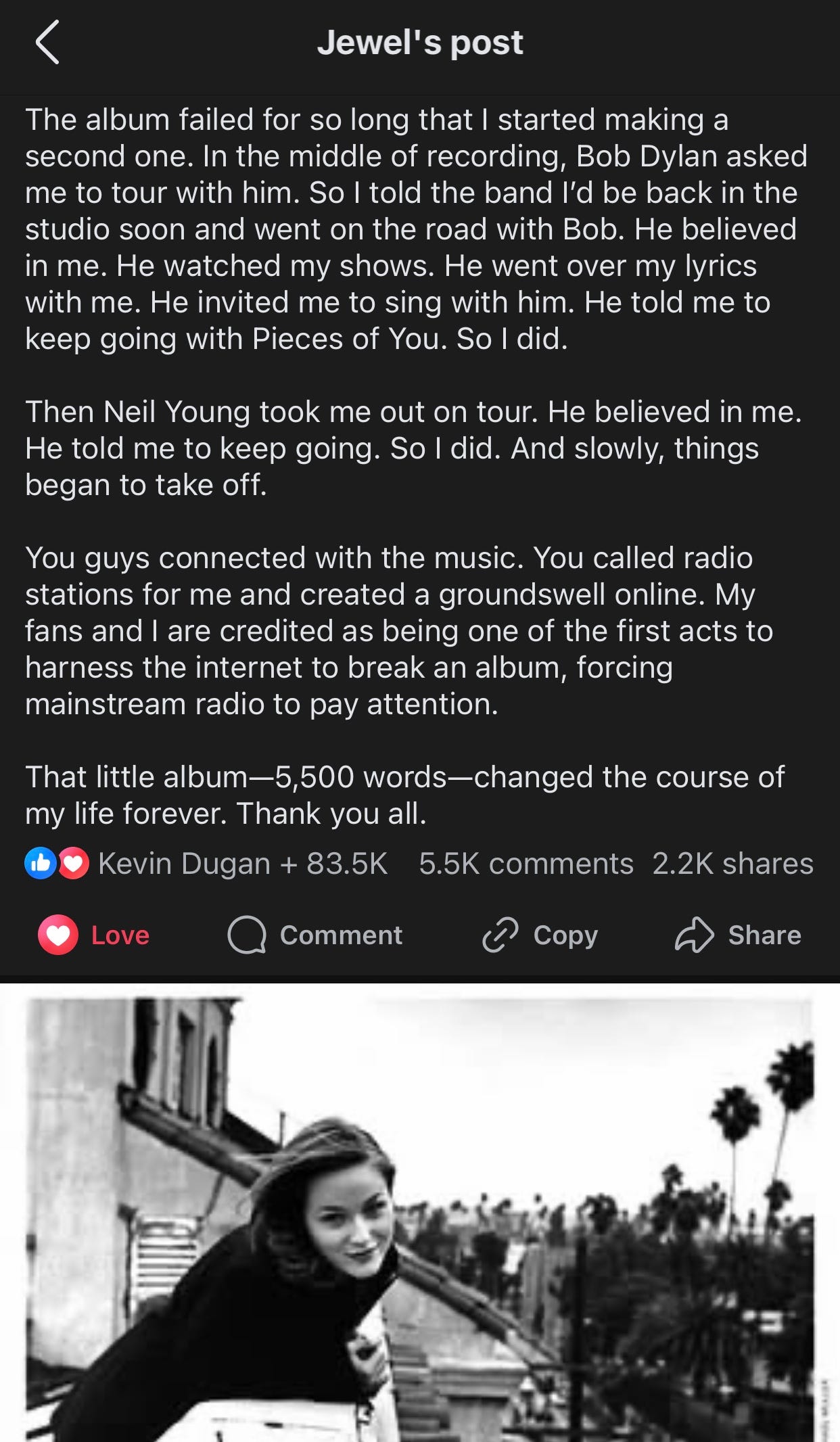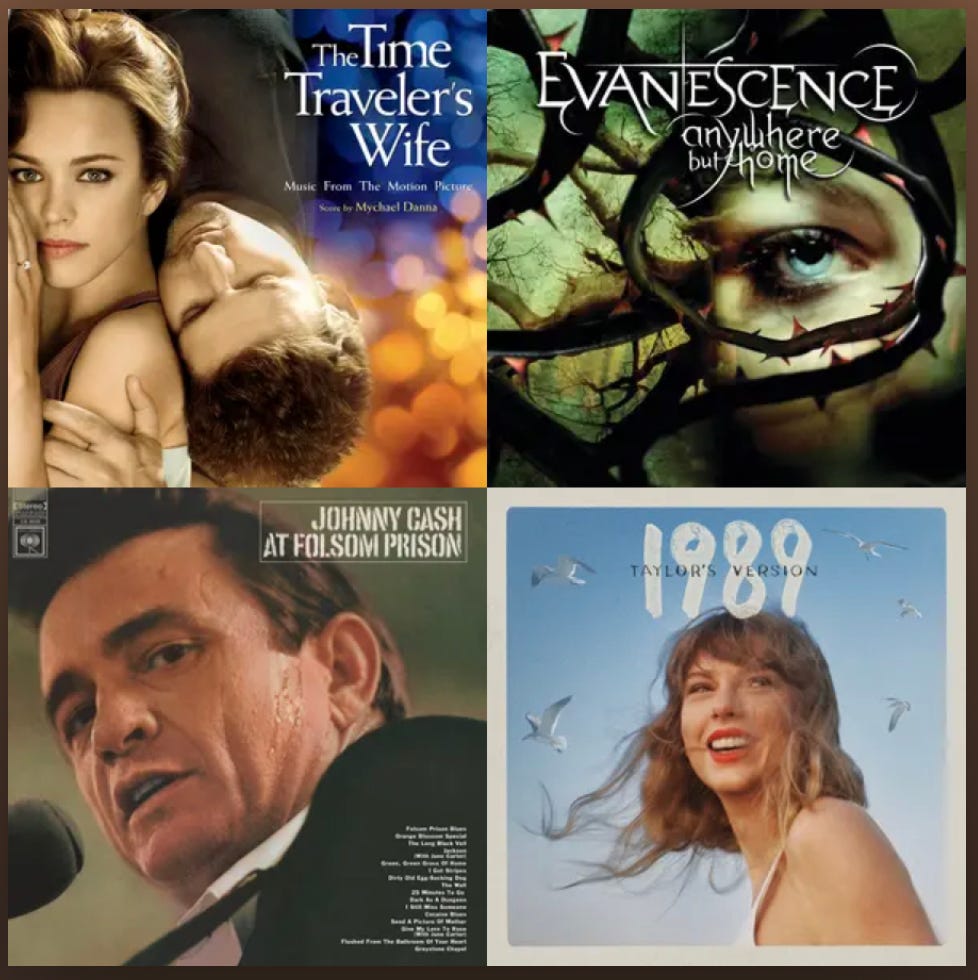Happy Thursday, y’all! Please Like and Restack this issue to help increase its visibility on Substack. Thank you! And if you getting value from my articles, please consider supporting me by subscribing to Backstage Pass. Free subscribers get access to all articles as they come out, after one month, older articles are paywalled. Paid subscribers have access to all Backstage Pass content with no paywalls. Paid Subscribers also have access to The Vault.
The Art of Understanding When the Audience Needs a Change
Let’s start this month’s edition of Marketing and Music with a pop-quiz:
Name the top songwriter in the 1960s. You have a few choices, maybe John Lennon, or Joan Baez, maybe Bob Dylan.
Now name the top songwriter for the 1970s. Again, you have a few choices; maybe John Denver, Elton John, or Carole King. A few others could come to mind for each decade.
Now name the top songwriter from the 1980s…it’s a bit harder to do, isn’t it? Maybe Prince? But clearly, the style of music created in the 1980s shifted away from songwriters, and toward a true ‘pop sound’. There were some great songwriters in the 1980s, but it seems like the craft itself of focusing on the power of lyrics and using a song to tell a story, wasn’t as pronounced in the 1980s as it had been in previous decades.
Given that, it’s likely that what happened on September 6, 1989 was inevitable.
At the time, Bon Jovi was arguably the top rock band in the country. Fans watching and attending the MTV Music Awards were preparing to hear the band take the stage and fill the building with all the booming rock energy you would expect from ‘big hair’ rock bands in the 1980s.
Instead, Jon Bon Jovi and Richie Sambora sat down with two acoustic guitars, and in the span of 8 mins reset the musical landscape and created a fissure between the music of the 1980s and what would become the sound of the 1990s.
Just like that, the ‘pop era’ of the 1980s was over. The sugary, syrupy glaze that coated songs during the 1980s, that muffled and choked the heartbeat of the song’s story, was gone.
Two things happened: First, this performance helped launch the MTV Unplugged era. It took a few years for this series to really get some traction, but by the mid 1990s, any band that wanted to make a name for itself was putting its music under the acoustic knife and appearing on MTV Unplugged.
This forced artists to strip away the booming instruments, and let their music and lyrics stand before the audience, naked. Sometimes it wasn’t a pretty picture, but for some bands, putting more of a focus on the lyrics and the story the song was telling, actually made their music more impactful.
One of my favorite songs ever is Alice In Chains’ song Down in a Hole. What I love about this song, and especially this performance, is it shows how good music sounds good whether it’s acoustic or not.
But in addition, going acoustic puts more of a focus on the singer and the story he or she is telling with the song itself. At the time of this performance, AiC’s lead singer was Layne Staley. Layne battled heroin addiction throughout the 90s, and would die from an overdose in 2002. This song, in many ways was autobiographical for Layne. He was talking about how he was down in a hole, battling drug addiction. How his life was spiraling out of his control.
But the one thing that I always loved about this song is Layne accepts that it’s all his fault. He details the struggles he is enduring, but always comes back to this key message: I did this to myself. That self-reflective message resonates more in this acoustic setting:
“I’d like to fly, but my wings have been so denied.”
This led to the second key development from the Unplugged movement: The songwriter was once again the hero. Music was less about booming guitars and instruments drowning out everything else. And more about letting artists express themselves via the stories they were telling in their songs.
The shifting musical landscaped was perfectly timed for some…
Sometimes It Be That Way…
In the early 1990s, a young Jewel Kilcher, living out of her car, started making a name for herself locally in San Diego. Her performances were raw, very folksy and very acoustic. Half performance, half monologue, she would talk with the audience about each song before she played it. What its story was about, what was going on in her life that prompted her to write it.
The audiences loved how Jewel took them into her world as a songwriter, and even her life. Her songs were frequently autographical, and as such, carried more emotional weight for the singer. Jewel would often be overcome with emotion as she sang, her voice fighting back tears as she sang lines such as ‘Yes it’s true…I’m too sensitive. But he takes pleasure in my pain.”
The changing musical styles fell perfectly for Jewel. If she had started singing in coffeehouses in the early 80s instead of early 90s, her style may have never found an audience. By 1997, she was one of the most popular rock stars on the planet. She recently left this Facebook update reflecting back on this time in her career:
And Jewel is correct; In the early to mid 1990s, she was one of the first artists to leverage an online fanbase (her EDAs or Everyday Angels) to help launch a career. I wrote more about Jewel and her amazing connection with her online fans during the 1990s here last year.
PS: Notice Jewel mentions that she wanted to give up on her debut album, but other artists and her fans convinced her to keep going. Reminds you a bit of writing here, doesn’t it? Don’t stop, keep going till the growth happens.
The Power of Story Resonates Across All Forms of Content
Every story has a core heartbeat. A lesson, a mystery, a joy, a tragedy that connects with us on some level.
My favorite Bible verse is in my profile, Proverbs 25:2. “It is the glory of God to conceal a matter, and the honor of kings to seek it out.”
This scripture speaks to the value of storytelling. Jesus in His teachings would often use parables to share wisdom, ending His story with “He who has ears to hear, let him hear!”
There was a message inside the message: Stories have value. They are like buried treasure in a field, if you chase them, if you seek out their meaning, you will be rewarded with something of value.
Stories can help us heal, grow, cleanse, or learn, all in an instant. Thankfully, in 1989 the musical industry rediscovered, at least for a time, the value of great storytelling.
Thank you for reading this month’s edition of Marketing and Music! I wanted to try something fun, if you are on Spotify, I have created a playlist from Backstage Pass. It will include songs from the movies and artists that have been covered here in Backstage Pass. Click the image to listen!
Thanks for reading and listening! I hope you have a wonderful weekend, see you next week!
Mack
Backstage Pass teaches you how to better connect with your customers, readers, clients, or donors. The lessons shared here draw on my experience over the last 20 years building customer engagement strategies for companies like Adobe, Dell, Club Med, Ingersoll-Rand, and countless others. I give you real-world research, examples and tactics that show you how to create customer engagement efforts that drive real business growth.
My Engagement Strategy for Substack
Happy Thursday, y’all! Please Like and Restack this issue to help increase its visibility on Substack. Thank you! And if you getting value from my articles, please consider supporting me by subscribing to Backstage Pass. Free subscribers get access to all articles as they come out, after one month, older articles are paywalled. Paid subscribers have acc…







Marketing and music are my favourite series here on Substack. You combine my two favourites, storytelling and music, packed in teachable posts; I learn so much— thank you
So it was all Bon Jovi's fault! lol Oh man that 80s hair. I think the rock stars of the 80s kept all the hair spray companies in business. Remember how MTV was so groundbreaking where we could watch and listen to music 24/7. Who would have ever thought it would be on demand a few decades later.
Unplugged = Vulnerability